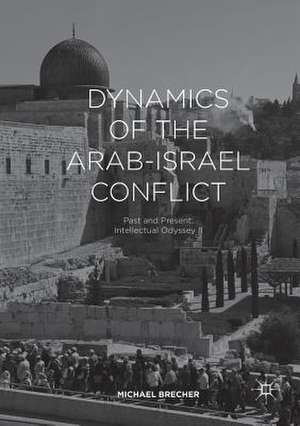Dynamics of the Arab-Israel Conflict: Past and Present: Intellectual Odyssey II
Autor Michael Brecheren Limba Engleză Paperback – 12 iul 2018
Preț: 165.59 lei
Nou
Puncte Express: 248
Preț estimativ în valută:
31.69€ • 32.96$ • 26.16£
31.69€ • 32.96$ • 26.16£
Carte disponibilă
Livrare economică 25 martie-08 aprilie
Preluare comenzi: 021 569.72.76
Specificații
ISBN-13: 9783319837710
ISBN-10: 3319837710
Pagini: 410
Ilustrații: XIX, 410 p.
Dimensiuni: 148 x 210 mm
Greutate: 0.51 kg
Ediția:Softcover reprint of the original 1st ed. 2017
Editura: Springer International Publishing
Colecția Palgrave Macmillan
Locul publicării:Cham, Switzerland
ISBN-10: 3319837710
Pagini: 410
Ilustrații: XIX, 410 p.
Dimensiuni: 148 x 210 mm
Greutate: 0.51 kg
Ediția:Softcover reprint of the original 1st ed. 2017
Editura: Springer International Publishing
Colecția Palgrave Macmillan
Locul publicării:Cham, Switzerland
Cuprins
1. Introduction
2. Historical Roots
3. Struggle for Jerusalem
4. Arab-Israel Perceptions
5. Israeli Leaders' Perceptions of the Arabs, the Arab-Israel Conflict, and Peace: Formative Generation, 1948-1977
6. Encounters with Arab Intellectuals and Officials: Views of Israel, Palestine, and Their Conflict (1975)
7. Conflict-Sustaining Acts in the Arab-Israel PC
8. The Arab-Israel Military Balance: 1967 and 1973
9. Crises Within the Arab-Israel PC: 1948-2014
10. Israel's Behavior in 1967 and 1973 Wars: Overall Findings
11. Evidence on Conflict Resolution: Partial Agreements and Overall Failed Attempts, 1937-2014
12. Assessments of the Way Out
13. Israel at 68: Beneath the Glitter
Notă biografică
Michael Brecher has authored 20 books and 85 articles, and edited 6 books in International Relations and Political Science, including two prestigious book awards, from the American Historical Association, for Nehru: A Political Biography (1959), and the Woodrow Wilson Prize, American Political Science Association, for the best book in politics and international affairs, The Foreign Policy System of Israel (1972). He has received Nuffield, Guggenheim, Rockefeller, and Canada Council Research Fellowships, and has served as a Visiting Professor at the University of Chicago, USA, Hebrew University of Jerusalem, Israel, University of California, Berkeley, USA, and Stanford University, USA.
Textul de pe ultima copertă
This book is designed to illuminate one of the most enduring and complex international conflicts in the 20th and early 21st centuries. It begins with a discussion of historical roots, noting four reinforcing levels of conflict: incompatible belief systems, Islam and Judaism; competing national goals; inter-communal rivalry; and discordant pledges to the principal adversaries by Great Britain during World War I. An array of political and military acts from 1933 to 1947 culminated in the UN Partition Resolution (29 November 1947), Israel’s proclamation of Independence (14 May 1948), and the beginning of the first of nine Arab/Israel wars the next day. The book then analyzes the following dimensions of this unresolved conflict: the struggle for Jerusalem since 1947; perceptions of the conflict and the conditions of peace by leaders and officials; their acts of violence and of political hostility; the Arab/Israel military balance and their behavior during the two most significant wars (June 1967 and October 1973); the mostly-failed attempts at conflict resolution from 1937 to 2014; the causes of continuing deadlock, except for two cold peace agreements (Egypt-Israel, Israel-Jordan), and the author’s assessments of the way out of the seven-decade impasse. The book concludes with an analysis of Israel at 68, mostly its policies and behavior towards the Palestinians from 1967 to 2016.
Caracteristici
Presents reflections from nearly seven decades of research and publications on the Arab-Israeli conflict
Analyzes rich archive of original interviews with the first two generations of Israeli leaders and Egyptian officials and academics
Offers historical reflections about Israel’s behavior, domestically and externally, in 1948-1949 and 2008 and beyond
Analyzes rich archive of original interviews with the first two generations of Israeli leaders and Egyptian officials and academics
Offers historical reflections about Israel’s behavior, domestically and externally, in 1948-1949 and 2008 and beyond
